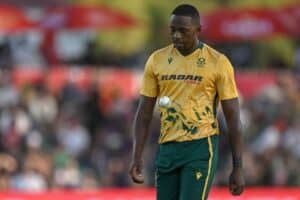The Abraham Accords are very similar to the Codesa talks that laid the groundwork for SA’s peaceful transition to a non-racial democracy.

What, if anything, can the Middle East learn from South Africa after the signing of the Abraham Accords – the landmark peace accord signed in 2020 between Israel, the United Arab Emirates (UAE), Bahrain and the United States and since joined by Morocco and Sudan, with Saudi Arabia and Oman expected to follow?
This was the question posed by the first ever Sharaka webinar arranged by the South African Jewish Board of Deputies and hosted by political analyst Mohamed-Nur Nordien in Johannesburg recently.
His panel included South African political analyst Jamie Mighti and Wits student activist and leader Gaby Farber; Sharaka founder Amit Deri and Israeli foreign ministry staffer Lorena Khateeb in Israel, as well as regional director of the British Middle East Centre for Studies and Research Amjad Taha in Bahrain.
For Mighti, the accords are very similar to the Convention for a Democratic South Africa (Codesa) talks that laid the groundwork for SA’s peaceful transition to a constitutional non-racial democracy in 1994, “people speaking to other people who do not share the same ideology, or even the same political aims”.
However, while SA’s process was intrastate, the Abraham Accords look towards an international solution.
The process is fraught with tension, exacerbated by the struggle for political control in Palestine between Hamas and Fatah, which adds complexity and lessens the opportunity for negotiation.
“There are a lot of geopolitical tensions too; Iran and Syria, all of which tie into the long-term health of the Middle East … but all of those realities make a case for people coming together, sitting down and doing the difficult diplomatic work. It’s uncomfortable, but it needs to be done.”
Sharaka, meaning partnership in Arabic, was set up six months ago as a youth leadership initiative in the wake of the accords to foster exchanges and understandings between the Gulf states, in particular, and Israel.
The initiative is premised on people-to-people engagement that spans cultures, education and sport, learning one another’s histories, traditions and faiths, visiting each other’s countries and even learning Arabic and Hebrew respectively.
Sharaka is aimed at the youth, said Deri, because “the world belongs to the youth, to those who are not cynical, but willing to dream”.
It’s important too to forge a peace unlike that signed with Egypt and Jordan, which Taha said had merely been a ceasefire, rather than a deal, that could allow Arabs to wander freely through Israel and Jews through the Gulf state.
“Peace means being able to celebrate and enjoy. It’s only peace if you work on people, not leave it on the politician’s desk,” he said.
Already the effect of the Abraham Accords is being felt in other ways, said Khateeb.
“Arab women used to be housewives or raise children. Now women in my community realise there can be change, so they want to pursue all fields; as doctors, as lawyers.”
There will be pushback, warned Mighti, just as Nelson Mandela faced when he began talking to the apartheid government, and continuing tensions, such as those today between the rhetoric of the ANC and its support for Palestine and the government’s relationship with Israel.
Taha believed the accords would lead to lasting peace – eventually.
“You have to start with those who want it, (people) in the UAE, Bahrain, Sudan and Morocco. They’re not all the same. We’re sure everyone will join the peace train in their own time.”
One of the lessons from SA, said Farber, was that engagement has to be authentic and participants had to admit their biases.
“As Nelson Mandela said, reconciliation is a spiritual process. It requires more than a legal framework. Twenty-seven years later there is still racism; there is still inequality. That’s because we didn’t have those hard conversations.”
For more news your way, download The Citizen’s app for iOS and Android.
Support Local Journalism
Add The Citizen as a Preferred Source on Google and follow us on Google News to see more of our trusted reporting in Google News and Top Stories.








